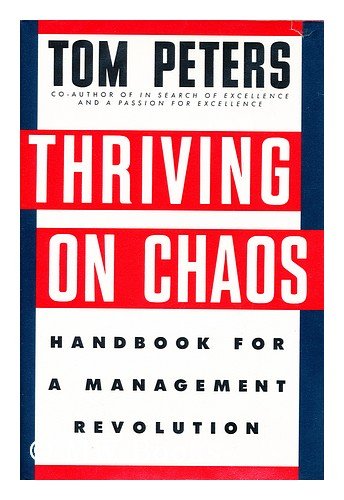Still useful, 24 years on!

This catchily-titled book was published in 1987, and was a management best-seller for years. Even then, new technologies, speed of change, intensifying competition were big issues. Whilst Tom Peters’ insights may not address all our current challenges, they’re worth revisiting. In this blog, I’ll explore how they might apply to organisations of all kinds, not just businesses.
Peter’s book is 523 pages long, oozing with motivational hyperbole about revolutionary leadership, extraordinary responsiveness etc, it’s key principles are by now well-established: the first is Customer focus and superior service. How might this apply to a charity or a campaigning organisation? I think it’s helpful to focus constantly on who your customers or clients are, and how you’re serving them. Setting high standards of service is a lot harder in voluntary teams, but is worth doing. It may push you to be clearer, frequently, with your own team about the vision and benefits of your project.
His second principle is Constant, rapid innovation. I like his approach to this, which is a ‘piloting culture’ that enables continual small-scale initiatives, some of which are scaled up. This was the way we’ve created the Future Conversations initiative, and it’s a relevant approach for all kinds of projects, not just business.
To help innovate, he advocates ‘creative swiping’, which might be better described as being constantly observant, and learning new ideas from a wide range of sources, including unlikely ones. For example, one of my maverick friends suggests studying refugee camps as a lead indicator for all our futures.
Peters’ third principle is Achieving flexibility by empowering people. It’s a well-trodden path these days, but always worth checking if you’re walking your talk. And he has some good tips on how to do this, including:
- Use self-managing teams
- Listen, celebrate, recognise
- Spend time lavishly on recruiting
- Train and retrain
- Simplify, reduce structure
- Reconceive the middle manager’s role
Principles like empowerment have benefit for all kinds of organisations, and I’d add to Peters’ list the benefits of smart methods of organising people, and using virtual communications. These are two of the many things that have impressed me about Extinction Rebellion, who clearly do thrive on chaos.
The fourth principle is Learning to love change: a new view of leadership at all levels. Many of his specific ideas are now well-known, but provide useful reminders. Mastering paradox becomes ever more vital in our crazy time, and it links to the co-creative approach in my Seven Seeds model. Listening, delegation, managing by example are all important for any organisation.
His last principle has remained highly topical: Building systems for a world turned upside down. However, by this time you can see the limitations of his mindset. His ways of doing this are largely cerebral, about measurements and controls: what about emotional intelligence, mutual support, inspiring vision?
One reason I value my ecosystem model of resilience is that it explores how we can thrive on chaos in more holistic ways than this book. Touching the heart and the gut are vital for teams in our times, and Mr Peters’ capitalist rhetoric will only take us part of the way.
